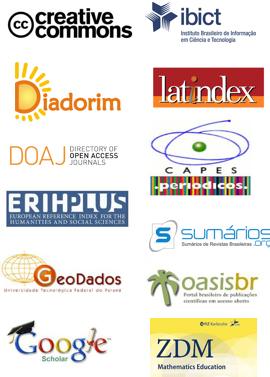A Hipótese dos Experimentos Mentais na Construção de Conceitos em Matemática
DOI:
https://doi.org/10.17921/2176-5634.2018v11n2p104-110Resumo
Este artigo tem a intenção de apresentar a hipótese dos experimentos mentais e suas caracterizações, com a pretensão de justificar ainda mais o interesse em atividades de investigação matemática, por meio dos experimentos mentais, e das bases semióticas da matemática. Parte desse trabalho foi resultado de uma pesquisa teórica desenvolvida no âmbito do programa de doutorado em Educação Matemática, pela Universidade Anhanguera de São Paulo, e teve como objetivo construir e analisar as características dos experimentos mentais na matemática e suas consequências no âmbito da Educação Matemática. Buscou-se também uma analogia entre os experimentos mentais e as provas matemáticas formais. Experimentos mentais são formas que o sujeito tem de colocar seus próprios pensamentos, dentro de um contexto previamente considerado, como objetos de considerações numa dada atividade e/ou problema, por meio de representações. Esses pensamentos são considerados abdutivos, ou seja, implicam generalizações na Matemática e exige uma teoria de experimentação e de análise. Buscar-se-á nesse texto esclarecer, com a construção de um cálculo de segmentos, quais aspectos se julgam importantes na dinâmica de considerar os experimentos mentais na construção do pensamento matemático, sem desconsiderar a importância de provas matemáticas formais.
Palavras-chave: Experimentos Mentais. Semiótica. Intuição. Pensamento Abdutivo.
Abstract
This text intends to present the theory of thought experiments and their characterizations, with the aim of further justifying the interest in mathematical research activities, by means of thought experiments, and the semiotic bases of mathematics. Part of this work was the result of a theoretical research developed within the PhD Program in Mathematical Education, by the Anhanguera University of São Paulo, and had the objective of constructing and analyzing the characteristics of thought experiments in mathematics and its consequences in Mathematical Education. An analogy was also sought between mental experiments and formal mathematical proofs. Thought experiments are forms that the subject has to put his own thinking, within a previously considered context, as objects of considerations in a given activity and / or problem, by means of representations. These thinking are considered abductive, that is, they imply generalizations in Mathematics and require a theory of experimentation and analysis. It will be sought in this text to clarify, with the construction of a segment calculus, which aspects are considered important in the dynamics of considering the thought experiments in the construction of mathematical thinking, without disregard the importance of formal mathematical proofs.
Keywords: Thought Experiments. Semiotics. Intuition. Thinking Abductive.
Referências
Brent, J. (1998). Charles Sanders Peirce: A life. Revised and
Enlarged Edition.
Cassirer, E. (1994). Ensaio sobre o homem. Uma Introdução a
uma filosofia da cultura humana. São Paulo: Martins Fontes.
Cruz, W. J. (2015). Experimentos mentais e provas matemática
formais. São Paulo: UNIAN.
Euclides. (2009). Os elementos. Rio Claro: UNESP.
Hilbert, D. (2003). Fundamentos da Geometria. Lisboa: Gradiva.
Hoffmann, H. G. M. (2006). Seeing problems, seeing solutions.
Abduction and diagrammatic reasoning in a theory of
scientific discovery. Georgia Institute of Technology: School
of Public Policy.
Kant, I. (1997). Crítica a razão pura. Lisboa: Fundação Caloute
Gulbenkian.
Kuhn T. S. (2011). A tensão essencial. São Paulo: UNESP.
Otte, M. (2012). A realidade das Idéias: Uma perspectiva
epistemológica para a Educação Matemática. Cuiabá:
EDUFMT.
Peirce, C. S. (1958). Collected Papers of Charles Sanders Peirce.
Cambridge, Mass: Harvard.
Peirce, C. S. (1967). Manuscript, according to Richard S. Robin,
Annotated Catalogue of the Papers of Charles S. Peirce. The
University of Massachusetts Press 1967.
Peirce, C. S. (2010). Semiótica. São Paulo: Perspectiva.
Schlick, M. (1918). Allgemeine Erkenntnislehre. Berlim: Verlag
Von Julius Springer.


